10 Best Salesforce Commerce Integrations Consulting Services to Stabilize Your Stack
July 28, 2025

Every time your team rolls out a new feature or syncs up with a new tool, you face a decision to build quick fixes or fix the foundation. If your storefront is lagging or your CRM and ERP don’t stay in sync, those delays pile up, and can slow down your launches, confuse your buyers, and cut into your revenue.
Integration gaps usually surface at the worst time. You can expect them at mid-promotion, during checkout, or when your analytics just don’t match reality.
In this article, we’ll help you compare the top Salesforce integrations consulting services and understand who can help stabilize your commerce cloud setup. You’ll get clear, practical advice for choosing the right partner and avoiding risks that drain time, budget, and performance.
First, let’s break down what these consulting services actually involve.
What Are Salesforce Commerce Integrations Consulting Services?
These consulting services help you connect Salesforce Commerce Cloud with core systems like your ERP, CRM, order management, PIM, analytics tools, and payment providers. They also remove the friction between platforms so your data flows cleanly across every touchpoint.
The main types of services include API-driven integrations, custom cartridge development, and middleware solutions. Each is built to match different levels of system complexity and internal bandwidth.
And they work. That’s why the consulting market for these services reached $1.23 billion in 2024 and is expected to grow to $3.45 billion by 2033. This surge reflects how important clean, scalable integrations have become for performance, agility, and faster delivery across complex commerce stacks.
That brings us to the next point:
Why Do You Need Salesforce Commerce Integrations Consulting Services?
You need Salesforce commerce integrations consulting services to fix the delays, disconnections, and breakdowns that come from patchwork systems. When integrations across your tech stack are unstable (or missing), your teams move more slowly, your data becomes unreliable, and your customer experience suffers.
The impact is clear because 74.2% of buyers rate system integration as a top priority when evaluating software. So the risk of putting this off grows with every system you add.
Here are the key advantages these consulting services bring:
- Accelerate time-to-market for new and enhanced integrations: When your storefront, ERP, and CRM are wired together properly, your team can ship updates faster. You won’t need to wait on manual syncs or one-off dev fixes just to roll out a new offer or promotion.
- Create secure, scalable, and maintainable connections: With proper API management, you don’t have to worry about integration limits, token refreshes, or security gaps across endpoints. A good partner builds for growth, so they take into account all these details.
- Cut down on silos between commerce, marketing, service, and fulfillment: Integration clears the road between departments. You avoid the common delays that happen when order data gets stuck or customer records don’t match across platforms like marketing cloud or your support tools.
- Improve storefront performance and conversion rates: Cleaner product data means faster load times, more relevant search results, and fewer drop-offs at checkout.
- Simplify maintenance and upgrades: You can avoid rework during seasonal updates or system changes because your integration layer won’t break under small changes.
- Improve decision-making with cleaner data: More accurate customer data helps you prioritize the right audiences, avoid duplication, and build better reporting across teams.
- Lower risk and control costs from integration failures: According to TDWI, outdated or manual integrations (often via spreadsheets or legacy ETL) frequently lead to delayed access to data. Over half of organizations say that by the time an integration request is completed, “the business has moved on to other priorities”. This is frustrating, yes, but it’s also financially inefficient. Every failed or late integration increases manual rework, contributes to downtime, and elevates risk (e.g., order mismatches, compliance lapses). Replacing them with modern pipelines or real-time integration platforms controls these risks and reduces operational costs by eliminating manual fixes, preventing outages, and improving data accuracy.
As the global system integration market grows at 13.8% CAGR from 2023 to 2030, falling behind is a likelihood if you’re not modernizing. That kind of sustained investment signals that competitors are actively building more connected, efficient tech stacks.
Top 10 Salesforce Commerce Integrations Consulting Services
Choosing the right partner for Salesforce commerce integrations can make or break your timeline, performance, and long-term stability. These are 10 trusted consulting providers with proven experience connecting Salesforce Commerce Cloud to the systems that matter, each with different strengths based on scale, stack, and industry fit.
1. Nova
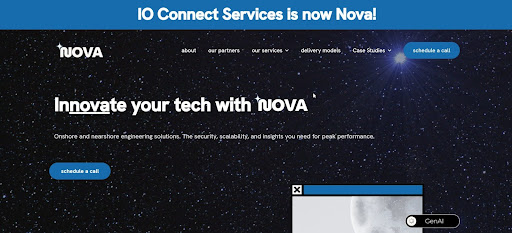
Nova gives you access to certified Salesforce Commerce Cloud teams who work in your time zone and speak your language. Our nearshore model keeps feedback loops short and project momentum strong.
You get a MACH-certified partner with deep AWS experience and a focus on composable architecture. Whether you need to connect Commerce Cloud to Salesforce Service, OMS, or CRM (or third-party tools like Segment, PIMs, or loyalty apps), we can build what fits your exact stack and goals.
Our services cover custom implementation, performance optimization, and headless builds using SCAPI, OCAPI, and microservices. The result is a scalable eCommerce platform with stable integrations and a faster release cadence.
You also get ongoing tuning, QA automation, and commerce audits to keep your storefront running smoothly after launch. Projects are scoped clearly, delivered reliably, and backed by teams with real commerce depth.
Key Features:
- End-to-end Salesforce Commerce Cloud implementation.
- Custom integration across ERP, OMS, CRM, and marketing cloud.
- Headless architecture and API-first builds.
- Continuous support and storefront optimization.
- Strategy consulting for experience-led commerce.
Pros:
- Strong technical track record and delivery discipline.
- Real-time collaboration from nearshore teams.
- Flexible pricing and value.
Cons:
- The nearshore model may not appeal if you’re used to fully offshore pricing.
Website: novacloud.io
Pricing: Custom quote.
2. TradeCentric
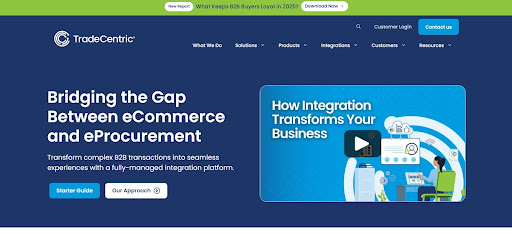
TradeCentric focuses on Salesforce B2B Commerce integration for companies selling through procurement systems. Their managed AppExchange solution includes over 220 Pre-built commerce connectors for tools like Ariba, Coupa, and Jaggaer.
With TradeCentric, you can automate PunchOut, order-to-cash, and invoicing workflows. This helps you remove manual friction between buyer and seller platforms. The company can work well for manufacturers and suppliers serving enterprise clients.
Key features:
- B2B commerce integration platform.
- Turnkey PunchOut catalogs.
- Order-to-cash automation.
- Multi-system connector support.
- Proactive integration management.
Pros:
- Designed for B2B buying flows and eProcurement standards.
- Reduces manual data entry and procurement cycle time.
- Responsive support and tailored onboarding.
Cons:
- Not designed for D2C commerce or consumer storefronts.
- Custom setups may require time and client-side coordination.
- Focused scope may not suit teams wanting broader flexibility.
Website: tradecentric.com
Pricing: Custom quote.
3. Saltbox
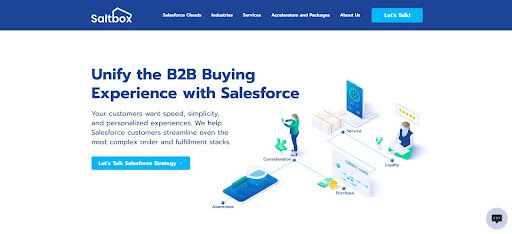
Saltbox is a low-code iPaaS platform from Vision33 that helps mid-market businesses quickly manage integrations between Salesforce Commerce Cloud and systems like ERP, PIM, and CRM.
You work from a single dashboard to deploy and maintain integrations, using prebuilt templates and visual workflows to reduce engineering cycles.
Key features:
- Accelerated commerce launch.
- Omnichannel integration.
- Customer-centric UX.
- Personalized B2B shopping.
- Scalable commerce platform.
Pros:
- Reduces custom code through templated, low-code workflows.
- Connectors for SAP Business One and other mid-market ERPs.
- Simplifies launch timelines for multi-system commerce.
Cons:
- Can be hard to reconfigure without vendor help.
- Recurring fees per connector can add up.
- Some projects face longer implementations.
Website: saltboxmgmt.com
Pricing: Custom quote.
4. Slalom

Slalom is a Salesforce Global Alliance Partner known for large-scale, cross-cloud projects. It offers strategic commerce consulting and full-cycle implementation across Salesforce commerce, marketing, and data cloud.
With thousands of engagements and reusable accelerators like “Buy with Prime,” it serves global brands needing enterprise control and integration scale.
Key features:
- Commerce & OMS modernization.
- Enhanced shopping experience.
- Seamless third-party apps integration.
- Analytics & operational excellence.
- Strategic commerce consulting.
Pros:
- Deep experience across Salesforce clouds and industry verticals.
- Strong documentation, planning, and stakeholder alignment.
- Well-suited for regulated or complex enterprise structures.
Cons:
- High cost of delivery may not fit all budgets.
- Consultant availability can vary by geography or domain.
- Scoping and pricing may shift during large bids.
Website: slalom.com
Pricing: Custom quote.
5. 6Street Digital
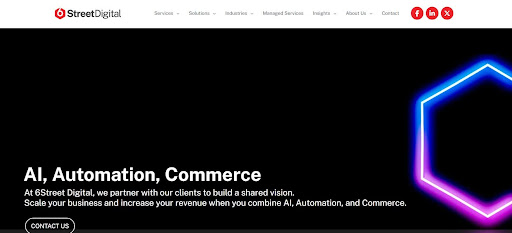
6Street Digital delivers headless and API-first Salesforce Commerce builds with a strong emphasis on digital experiences. Their team helps you unify UX strategy with backend architecture, using Agile methods for quick iterations.
They’re a compact team focused on building composable B2B, B2C, and D2C commerce storefronts with deep Salesforce cloud alignment. With certified developers and UX specialists, they integrate commerce cloud with Sales, Service, or CPQ as needed.
Key features:
- Customized DTC/B2B commerce.
- Systems integration.
- Fulfillment automation.
- Customer engagement tools.
- Advanced commerce features.
Pros:
- Sharp UX and headless expertise for complex commerce use cases.
- Direct team access and hands-on delivery approach.
- Agile model that aligns well with fast-moving teams.
Cons:
- Smaller firm size may limit scale for enterprise rollouts.
- Narrow focus on Salesforce may not suit multi-platform stacks.
Website: 6st.co
Pricing: Custom quote.
6. Merkle

Merkle stands out as a powerhouse in Salesforce Commerce Cloud consulting by combining deep expertise in data science with enterprise-grade commerce engineering and identity solutions.
As one of Salesforce’s longest-standing partners, Merkle brings decades of real-world experience in complex integrations and omnichannel strategies. With over 3,000 Salesforce-certified professionals and 8,900 certifications, the company ranks among the largest Commerce Cloud partners globally.
Key features:
- B2B commerce transformation.
- Sales & service enablement.
- Product information management (PIM).
- Multi-cloud integration.
- Industry focus.
Pros:
- Deep experience with industrial B2B buyers and sales models.
- Speeds up implementation with templates tailored to manufacturing.
- Strong domain understanding for ERP-heavy environments.
Cons:
- Less relevant for retailers or personalized shopping experience models.
- Premium pricing structure may deter budget-conscious teams.
- Limited scope outside the manufacturing vertical.
Website: merkle.com
Pricing: Custom quote.
7. Trifecta Technologies
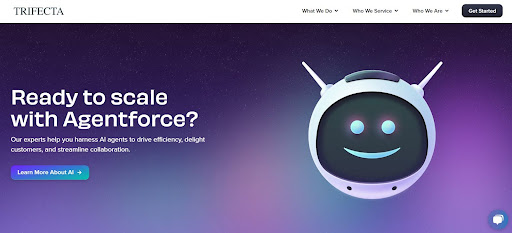
Trifecta specializes in multi-cloud Salesforce deployments by helping you link integration between commerce cloud and Service, Marketing, and Sales. Their “Customer 360” approach connects customer data and order flows across platforms.
You can use their rapid deployment kits to move fast or scale with custom workflows and real-time product information flows.
Key features:
- B2B commerce cloud expertise.
- Rapid launch accelerators.
- Headless & microsite solutions.
- Commerce-OMS integration.
- Analytics and mobile commerce.
Pros:
- Long Salesforce track record with 600+ cross-cloud projects.
- Strong multi-cloud orchestration for enterprise use cases.
- Good client satisfaction score across verticals.
Cons:
- Entry cost may be too high for small-to-mid-sized projects.
- Less flexibility in adapting to lean or short-term needs.
- More formal delivery process may not suit agile startups.
Website: trifecta.com
Pricing: Custom quote.
8. Innovadeltech
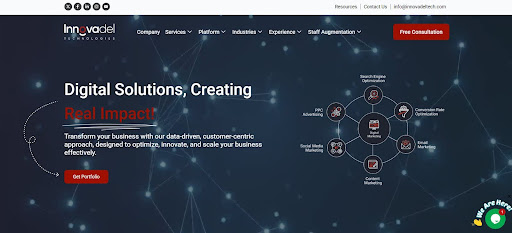
Innovadeltech delivers affordable Salesforce Commerce Cloud services through a global model. Its offshore team builds custom cartridges, handles Order Management System (OMS) integration, and develops connectors for AppExchange and third-party systems.
If you’re looking for cost-effective solutions without sacrificing Salesforce standards, this firm fits well, especially for small to mid-market projects (however, they do claim enterprise work, too). Clients usually choose Innovadeltech to stretch limited budgets while still getting skilled delivery teams.
Side note: Curious how architecture choices like SFRA vs Headless affect integration scope and cost? This guide breaks it down so you can make the right call before scoping your next build.
Key features:
- Full-stack commerce services.
- Order management integration.
- Data migration & onboarding.
- AppExchange & third-party connectors.
- Salesforce 360 services.
Pros:
- Affordable for SMBs and startups.
- Responsive team with clear technical communication.
- Capable of handling commerce cloud cartridge customization.
Cons:
- Smaller team size may delay turnaround for multiple parallel projects.
- Some variability in schedule consistency.
Website: innovadeltech.com
Pricing: Custom quote.
9. Folio3
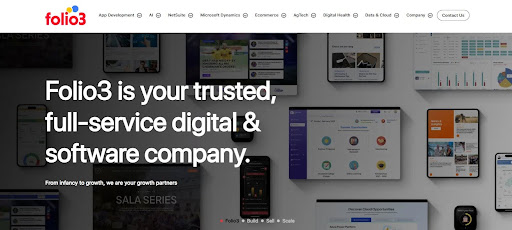
Folio3 blends onshore project oversight with offshore delivery to cut costs while maintaining quality. They’re known for complex integrations between Salesforce Commerce Cloud and systems like Mintsoft, Stripe, Square, and ERP/OMS platforms.
Their team supports midsize clients needing tailored workflows across payments, logistics, and commerce automation. This hybrid structure gives you flexibility while helping you manage both cost and scope.
Key features:
- E-commerce strategy & optimization.
- Custom commerce integrations.
- DevOps & automation.
- Middleware & cross-cloud integration.
- Ongoing support & managed services.
Pros:
- Strong communication and transparency throughout delivery.
- Consistent project delivery on time and within budget.
- Solid experience in payment and logistics integration.
Cons:
- Early-stage project management setup may require extra attention.
- Hybrid model needs clear documentation to avoid misalignment.
- Not ideal for teams that require fully onshore delivery.
Website: folio3.com
Pricing: Custom quote.
10. Onilab
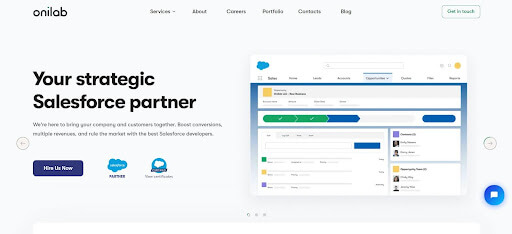
Onilab supports Salesforce Commerce Cloud with a focus on frontend speed and Magento migration. If you’re replatforming from Magento, Shopify, or WooCommerce, their zero-data-loss promise helps reduce risk.
They also tune frontend performance by targeting caching, media assets, and rendering logic. Teams with UX issues or poor Core Web Vitals will benefit most from Onilab’s frontend-first mindset.
Key features:
- Comprehensive commerce cloud consulting.
- Salesforce ecosystem integration.
- Advanced storefront customization.
- Continuous improvement & support.
- End-to-end migration & replatforming.
Pros:
- Known for handling complex frontend performance optimization.
- Strong technical team used to working with legacy platforms.
- Collaborative and flexible in delivery models and tooling.
Cons:
- Slight overruns on scope or timeline when requirements aren’t clearly locked.
- Limited specialization outside Magento and Salesforce stack.
Website: onilab.com
Pricing: Custom quote.
How to Choose Salesforce Commerce Integrations Consulting Services
Choosing the right Salesforce commerce integrations consulting services partner means avoiding technical debt, launch delays, and future rebuilds. The right partner can help you solve your current needs and scale without rework.
These are the checks you should make before signing with any provider:
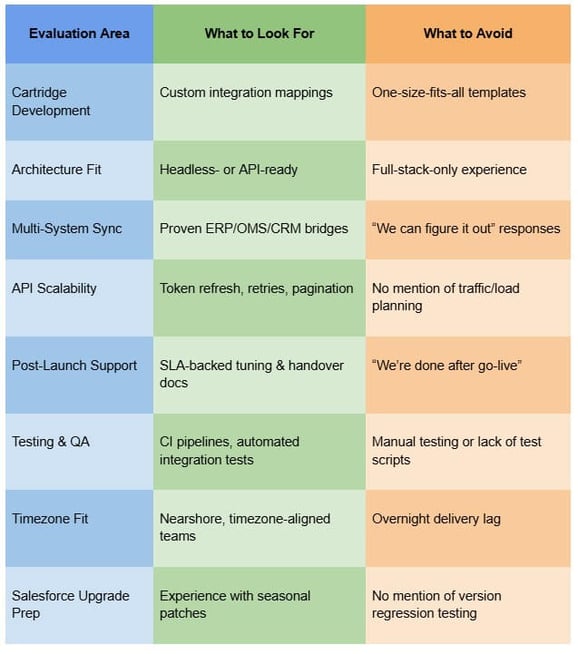
- Check if they build custom cartridges or rely only on prebuilt connectors: Prebuilt tools can move fast, but not every use case fits a template. Ask whether they can build custom integration mappings when needed to avoid brittle workarounds.
- Verify their experience with headless and composable architecture: If you’re moving into unified commerce or already run headless, you’ll need someone comfortable with modular APIs and distributed storefronts, not just full-stack templates. For example, teams with Hydrogen or PWA Studio frontends will struggle if the consultant only knows SFRA. Ask for examples of composable builds they’ve delivered.
- Confirm their ability to integrate multiple systems together (ERP + OMS + CRM): Real-time sync across platforms is key. If they’ve never tied Salesforce to something like NetSuite, SAP, or Zendesk, you’ll hit snags during execution. If your inventory lives in SAP, your customer records in HubSpot, and your orders in an external OMS like Manhattan, your partner must prove they’ve built similar syncs (ideally with Salesforce in the middle).
- Ask about API security, rate limiting, and scalability measures: Poor API-first connectivity can throttle traffic or expose vulnerabilities. Ask how they handle auth tokens, retries, and payload limits in high-load scenarios. For instance, API requests can spike during high-traffic sales. A partner that plans for the retry logic, token refreshes, and concurrent limits we told you about will save you from failed checkouts or exposed credentials.
- Evaluate their post-go-live monitoring, tuning, and support: Most problems surface after launch. So, make sure to look for partners who offer SLA-backed support and clear handover docs.
- Review their integration testing and QA automation processes: Debugging across services takes time. You’ll want automated tests that catch sync issues, failed calls, and broken field mappings early. Besides, let’s say your product feed breaks during a nightly sync and no automated test flags it. In this case, you could show outdated inventory for hours. So, look for firms that include CI pipelines and regression tests with mocks or test stubs for key systems.
- Assess timezone overlap and collaboration model (nearshore vs. offshore): Delayed feedback slows delivery. Teams aligned to your hours reduce delays associated with asynchronous communication and help resolve blockers faster.
- Confirm knowledge of Salesforce versioning and upgrade readiness: Salesforce pushes seasonal updates. Your partner needs to test those changes and patch your integration stack before issues reach production.
Choosing the Right Salesforce Commerce Integration Partner
The gaps between your systems aren’t just technical issues. They can slow growth, weaken your customer service, and drain your team’s time. They are also very costly. Picking the right partner helps you close those gaps for good.
Nova works closely with digital teams to remove bottlenecks, stabilize performance, and future-proof your integration stack across tools like ERPs, CRMs, and payment processing platforms.
Our Salesforce-certified teams bring nearshore speed, hands-on collaboration, and long-term support that fits your roadmap. Whether you’re scaling into headless, refining APIs, or fixing sync failures, Nova helps you move with confidence.
Schedule a quick call to see how Nova fits into your plans.
FAQ
What is the difference between a Salesforce Commerce integration and a custom cartridge?
A Salesforce Commerce integration connects external platforms like your ERP or OMS to your eCommerce platform using APIs or middleware. A custom cartridge, on the other hand, is a code package built directly inside a commerce cloud to handle storefront logic and system connections. While cartridges work inside your storefront codebase, integrations usually run outside it and manage data exchange across integration points.
How much do Salesforce Commerce integration services cost?
Salesforce Commerce integration services typically range from $10,000 to over $200,000, depending on scope. Prices vary based on how many systems you need to connect, your chosen integration type, and whether you’re migrating to headless or upgrading legacy middleware. A full-cycle project that covers design, build, testing, and post-launch support will fall on the higher end of the spectrum.
How long does a typical Salesforce Commerce integration project take?
Most integration projects run between 2 to 6 months, depending on complexity and team capacity. A smaller setup that links CRM and ERP might wrap up in 8-10 weeks, while a full-scale B2B commerce stack with PIM, OMS, and custom APIs may take closer to 5-6 months. Time-zone alignment and DevOps maturity can shorten or stretch that window.
Do I need a consulting partner for Salesforce Commerce integrations, or can my internal team handle it?
If your team is already stretched thin or unfamiliar with Salesforce cartridge architecture, then a consulting partner saves time and cuts risk. Integration projects require specialized skills in API management, system architecture, and CI/CD pipelines. Without the right support, you’ll face delays and instability that hurt performance across your customer lifecycle.
What’s the risk of poor Salesforce Commerce integrations?
Poor integrations disrupt data flow, break storefront features, and increase manual overhead for your team. That means lost orders, slow pages, or failed syncs between systems like your ERP, OMS, and inventory. Inconsistent data across customer touchpoints also damages your brand experience and limits personalization efforts.
How do I know if my existing integrations are slowing down my site?
You’ll notice signs like delayed checkout, inventory mismatches, and performance drops during high traffic. Metrics like API response times, failed data syncs, and load testing logs show where the bottlenecks are. An audit from a partner familiar with Salesforce integration services will help pinpoint and fix the issues before they hit your customers.
Comments